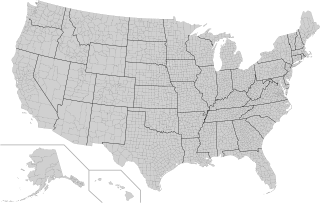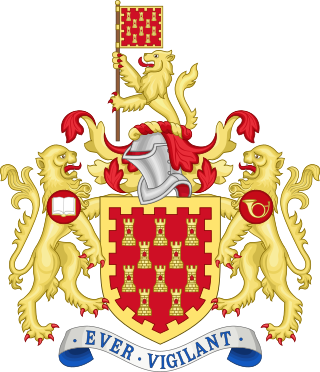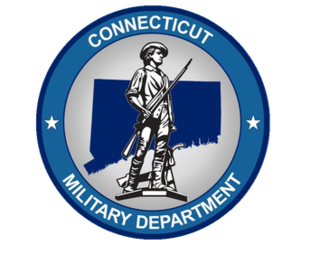
The Federal Energy Regulatory Commission (FERC) is an independent agency of the United States government that regulates the interstate transmission and wholesale sale of electricity and natural gas and regulates the prices of interstate transport of petroleum by pipeline. FERC also reviews proposals to build interstate natural gas pipelines, natural gas storage projects, and liquefied natural gas (LNG) terminals, in addition to licensing non-federal hydropower projects.

In the United States, a county or county equivalent is an administrative or political subdivision of a U.S. state or other territories of the United States which consists of a geographic area with specific boundaries and usually some level of governmental authority. The term "county" is used in 48 states, while Louisiana and Alaska have functionally equivalent subdivisions called parishes and boroughs, respectively. The specific governmental powers of counties vary widely between the states, with many providing some level of services to civil townships, municipalities, and unincorporated areas. Certain municipalities are in multiple counties; New York City is uniquely partitioned into five counties, referred to at the city government level as boroughs. Some municipalities have been consolidated with their county government to form consolidated city-counties, or have been legally separated from counties altogether to form independent cities. Conversely, counties in Connecticut and Rhode Island, eight of Massachusetts's 14 counties, and Alaska's Unorganized Borough have no government power, existing only as geographic distinctions.

The University of Connecticut (UConn) is a public land-grant research university system with its main campus in Storrs-Mansfield, Connecticut. It was founded in 1881 as the Storrs Agricultural School, named after two benefactors. In 1893, the school became a public land grant college, then took its current name in 1939. Over the following decade, social work, nursing, and graduate programs were established. During the 1960s, UConn Health was established for new medical and dental schools. UConn is accredited by the New England Commission of Higher Education.

The minister of transport is a minister of the Crown in the Canadian Cabinet. The minister is responsible for overseeing the federal government's transportation regulatory and development department, Transport Canada, as well as Canada Post, the Saint Lawrence Seaway, Nav Canada, and the Port Authority system. Since 26 July 2023, the position has been held by Pablo Rodriguez of the Liberal Party.

The Greater Manchester County Council (GMCC) was the top-tier local government administrative body for Greater Manchester from 1974 to 1986. A strategic authority, with responsibilities for roads, public transport, planning, emergency services and waste disposal, it was composed of 106 directly elected members drawn from the ten metropolitan boroughs of Greater Manchester. The Greater Manchester County Council shared power with ten lower-tier district councils, each of which directed local matters. It was also known as the Greater Manchester Council (GMC) and the Greater Manchester Metropolitan County Council (GMMCC).
The State Rail Authority, a former statutory authority of the Government of New South Wales, operated and maintained railways in the Australian state of New South Wales from July 1980 until December 2003.

The functions of local government in the Republic of Ireland are mostly exercised by thirty-one local authorities, termed County, City, or City and County Councils. The principal decision-making body in each of the thirty-one local authorities is composed of the members of the council, elected by universal franchise in local elections every five years from multi-seat local electoral areas using the single transferable vote. Many of the authorities' statutory functions are, however, the responsibility of ministerially appointed career officials termed Chief executives. The competencies of the city and county councils include planning, transport infrastructure, sanitary services, public safety and the provision of public libraries. Each local authority sends representatives to one of three Regional Assemblies.

Long Island Power Authority is a municipal subdivision of the State of New York that owns the electric transmission and electric distribution system serving all of Long Island and a portion of New York City known as the Rockaways. LIPA was originally created under the Long Island Power Act of 1985 to acquire the Long Island Lighting Company (LILCO)'s electric and natural gas infrastructure after the cancellation of the Shoreham Nuclear Power Plant. LIPA acquired LILCO's transmission system in May 1998, while the remainder of LILCO's natural gas-related infrastructure merged with Brooklyn Union Gas to form KeySpan Energy.
New York state public-benefit corporations and authorities operate like quasi-private corporations, with boards of directors appointed by elected officials, overseeing both publicly operated and privately operated systems. Public-benefit nonprofit corporations share characteristics with government agencies, but they are exempt from many state and local regulations. Of particular importance, they can issue their own debt, allowing them to bypass limits on state debt contained in the New York State Constitution. This allows public authorities to make potentially risky capital and infrastructure investments without directly putting the credit of New York State or its municipalities on the line. As a result, public authorities have become widely used for financing public works, and they are now responsible for more than 90% of the state's debt.

A concession or concession agreement is a grant of rights, land, property, or facility by a government, local authority, corporation, individual or other legal entity.
Municipal broadband is broadband Internet access offered by public entities. Services are often provided either fully or partially by local governments to residents within certain areas or jurisdictions. Common connection technologies include unlicensed wireless, licensed wireless, and fiber-optic cable. Many cities that previously deployed Wi-Fi based solutions, like Comcast and Charter Spectrum, are switching to municipal broadband. Municipal fiber-to-the-home networks are becoming more prominent because of increased demand for modern audio and video applications, which are increasing bandwidth requirements by 40% per year. The purpose of municipal broadband is to provide internet access to those who cannot afford internet from internet service providers and local governments are increasingly investing in said services for their communities.

The Connecticut Military Department is a state agency of the government of Connecticut. Its primary components are the Connecticut Army National Guard, the Connecticut Air National Guard, and four companies of the state militia. The Military Department of the State of Connecticut traces its origins to May 11, 1637, when the "General Courts" established a military arm of the provincial government. In 1939, the State's Military Department was established to consolidate the offices of Adjutant General, Quartermaster General, Armory Board, and Armory Board Inspector.

Space Florida is the aerospace economic development agency of the State of Florida. Founded in 2006, it works with commercial space companies, other governmental agencies, and academic institutions to develop space-related infrastructure.
In the United Kingdom, byelaws are laws of local or limited application made by local councils or other bodies, in specific areas using powers granted by the relevant Acts of Parliament, and so are a form of delegated legislation. Some byelaws are also made by private companies or charities that exercise public or semi-public functions, such as airport operators, water companies or the National Trust.

The electricity sector in Sri Lanka has a national grid which is primarily powered by hydroelectric power and thermal power, with sources such as photovoltaics and wind power in early stages of deployment. Although potential sites are being identified, other power sources such as geothermal, nuclear, solar thermal and wave power are not used in the power generation process for the national grid.
An electric utility, or a power company, is a company in the electric power industry that engages in electricity generation and distribution of electricity for sale generally in a regulated market. The electrical utility industry is a major provider of energy in most countries.
American Electric Power Company v. Connecticut, 564 U.S. 410 (2011), was a United States Supreme Court case in which the Court, in an 8–0 decision, held that corporations cannot be sued for greenhouse gas emissions (GHGs) under federal common law, primarily because the Clean Air Act (CAA) delegates the management of carbon dioxide and other GHG emissions to the Environmental Protection Agency (EPA). Brought to court in July 2004 in the Southern District of New York, this was the first global warming case based on a public nuisance claim.

New Zealand has a unitary system of government in which the authority of the central government defines sub-national entities. Local government in New Zealand has only the powers conferred upon it by the New Zealand Parliament. Under the Local Government Act 2002, local authorities are responsible for enabling democratic local decision-making and promoting the social, economic, environmental, and cultural well-being of their communities, as well as more specific functions for which they have delegated authority.

Transport for NSW (TfNSW) is a New South Wales Government transport services and roads agency established on 1 November 2011. The agency is a different entity to the NSW Department of Transport, which is a department of the state government of New South Wales, and the ultimate parent entity of Transport for NSW.

The Water Services Entities Act 2022 is an Act of Parliament in the New Zealand Parliament that creates four new water services entities to assume the water services responsibilities of territorial authorities. The Bill is part of the Sixth Labour Government's Three Waters reform programme. The Bill passed its third reading on 7 December 2022, and received royal assent on 14 December 2022.













